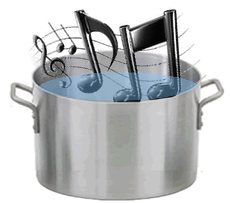
Soundcloud is a great service that allows musicians to easily share their creations and have listeners leave in-line comments on the music. But I’ve recently discovered an alternative use case of the service that’s very useful: it removes all the friction associated with “marinating” your music.
By “marinating” I mean that period after you’ve recorded something when you sit back and absorb it in different settings hearing the different sounds that present in different environments. If you’ve ever seen the movie Once with Glen Hansard this is “the car test.” Having interacted with a piece exclusively via your recording setup you’ll hear new facets to the song once you take it in jogging with an iPod, driving around via your car stereo or listening full blast on your buddy’s entertainment center.
In the past to get this kind of diversity of perspective one had to burn a CD, save it to iTunes, put it on the iPod, etc. There was just enough friction that you’d only do this once you had mastered the final mix as a sanity check. But Soundcloud has made it so easy that exporting the track and uploading (~2min of work depending on the length of the piece) is entirely frictionless. I find myself using the service to iteratively get more insight into the track I just recorded which helps me incorporate drastic changes. Here’s a case in point:
I was just tinkering with my buddy Nate’s song “Somewhere Safe.” I love the outro to this song so I pulled it into my music editor and started messing around remixing it. I came up with this:
But driving around listening to that I heard the refrain of another song by the band Snow Patrol so I went back, tweaked some things and made this:
This is kind of a silly example but It was only through driving around and letting that song “marinate” that I heard the other refrain. The takeaway here is that Soundcloud operates not just at a “sharing what’s finished” level but also works earlier in the formative stages of constructing songs. And it’s not that it enables anything you couldn’t do before, it just removes enough of the friction so that you will do it. Anyways, neat.






